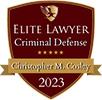Illinois Supreme Court Rules on Recorded Conversations
 The Illinois Supreme Court recently ruled on the constitutionality of a statute regarding the legality of audio-recording a conversation. According to that law, any person who records a conversation without the consent of all parties involved in the conversation commits a crime. The law as written is broad, and defines a conversation as any oral communication between two or more people, regardless of whether one of the parties intends for the conversation to be private.
The Illinois Supreme Court recently ruled on the constitutionality of a statute regarding the legality of audio-recording a conversation. According to that law, any person who records a conversation without the consent of all parties involved in the conversation commits a crime. The law as written is broad, and defines a conversation as any oral communication between two or more people, regardless of whether one of the parties intends for the conversation to be private.
Facts of the Case
The facts giving rise to the case that was eventually heard by the Illinois Supreme Court involve a pro-se party to a child support proceeding. That party recorded a hearing that was held in open court during which a court reporter was not present. He also recorded a conversation between himself and opposing counsel prior to the start of the hearing. The recording was the pro-se party’s only record of the proceedings, in which he participated without the benefit of counsel or a court reporter keeping a record. He was charged with violating the aforementioned statute as a result of these actions.
Court’s Holding
The Illinois Supreme Court held that the above statute violates the First Amendment, as the law places a greater burden on speech than what is required to protect the interest in conversational privacy. The Court reasoned that the statute criminalizes a broad range of conduct regarding recording all conversations, even those that may not be considered private under any circumstances, including any conversation that is loud enough to be overheard by a third party, whether in a public or a private setting. Not all conversations implicate privacy interests, but the law as written failed to distinguish that fact, despite the fact that the law did contain several exceptions. The Court stated that recordings of truly private conversations would remain under the scope of the statute, as a narrower interpretation of law better serves the intent in enacting it.
In addition, the statute criminalized conduct that, seen another way, is perfectly legal. For example, if a person overheard a conversation without recording it and later quoted a portion of the communication in a publication, no law would be broken. However, if the same person merely recorded a conversation without having published any of its contents, the act would be a crime.
The Court concluded that the statute went too far in trying to protect a citizen’s interest in private conversations, and that it put more burden on free speech than necessary to serve its interests. The Court deemed the statute overly broad and, therefore, unconstitutional.
In addition to the enactment of new laws, laws that have been on the books change and are tested in Court regularly. While every member of the public may not be aware of this fact, it is an attorney’s responsibility to keep informed of new laws and changes to existing ones. That is why hiring an experienced criminal defense attorney to protect your rights is so important. If you have been charged with a crime in the Chicago area, contact the Law Office of Christopher M. Cosley today for a consultation.






















